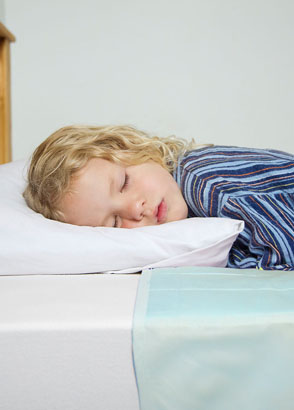What causes nightmares?
Nightmares are usually a part of normal development and are a sign of a young child’s developing imagination. Children are also more likely to have nightmares after a frightening experience.
There are several things that you can do to help reduce the likelihood of nightmares:
-
Avoid scary stories, television shows, or movies before bedtime. These will increase the likelihood of your child having a nightmare. Choose instead a comforting bedtime routine.
-
Identify stressors. If there is something in your child’s life that you know is distressing, try to take care of it and reassure your child. If your child suddenly experiences a significant increase in the frequency or intensity of nightmares, try to evaluate why. Look for recurring themes that could give you a clue as to the cause and then deal with the problem.
-
Ensure that your child is getting enough sleep. Children are much more likely to have nightmares after not getting enough sleep. If your child is having nightmares, make sure that she is getting enough sleep as this can help decrease both the frequency and the intensity of nightmares.
Leave a light on
If your child insists on having a light on, put it on the dimmest setting possible so that your child can fall back to sleep.
Discuss it the next day
The next day, you may want to try and talk to your child about her nightmare to see if there is anything bothering her. Most of the time nightmares are isolated events with little meaning, but if your child starts having them on a frequent basis you should try and figure out what is disturbing her.
Encourage the use of imagination
Some children do well with using their imagination to get rid of nightmares. Your child can draw pictures of her bad dreams and then throw them away, or she can imagine different endings to her nightmares. Even a dream catcher hung over a her bed may be reassuring.
Get outside help
If your child’s nightmares are severe, meaning that they are interfering in her life or occurring on a very frequent basis, speak to her physician or a mental health provider.
Sleep Handout from © Mindell JA & Owens JA (2003). A Clinical Guide to Pediatric Sleep: Diagnosis and Management of Sleep Problems. Philadelphia: Lippincott Williams & Wilkins.


















